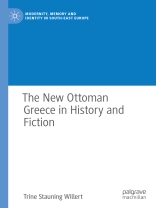This book explores the increasing interest in the Ottoman past in contemporary Greek society and its cultural sphere. It considers how the changing geo-political balances in South-East Europe since 1989 have offered Greek society an occasion to re-examine the transition from cultural diversity in the imperial context, to efforts to homogenize culture in the subsequent national contexts. This study shows how contemporary immigration and better relations with Turkey led to new directions in historiography, fiction and popular culture in the beginning of the twenty-first century. It focuses on how narratives about cultural co-existence under Ottoman rule are used as a prism of national self-awareness and argues that the interpretations of Greece’s Ottoman legacy are part of the cultural battles over national identity and belonging. The book examines these narratives within the context of tension between East and West and, not least, Greece’s place in Europe.
Tabla de materias
1. Introduction – The New Ottoman Greece: A Heritage in Search of Identity and Inheritors.- 2. New Approaches to the Ottoman Legacy in Historiography, Education, and Music Studies.- 3. Fearing Neo-Ottomanism: Counter-discourses and Reactions to the ‘New Ottoman Greece’.- 4. Cultivating Osmanalgia: Intersections of History and Fiction in Thessaloniki.- 5. Narrating the Nation and its (Ottoman) Legacy: The Greek Historical Novel and the Role of Fiction Writers.- 6. Appropriating the Ottoman Past in Three Novels: Greek-Turkish Friendship, Nostalgia and Religious Co-existence.- 7. Epilogue – Ottoman Greece from 1980 to 2018.
Sobre el autor
Trine Stauning Willert is an Honorary Research Fellow at the University of Birmingham’s Centre for Byzantine, Ottoman and Modern Greek Studies, UK. Previously she was Assistant Professor in Modern Greek Studies at the University of Copenhagen where she was a member of the research centre ‘The Many Roads in Modernity: South-East Europe and its Ottoman Roots’.












